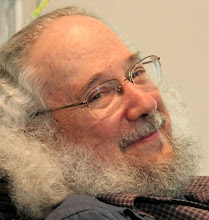Lose the lecture
-->
On New Year’s Day, my favorite radio program, All
Things Considered, aired a clip from Emily Hanford’s American Radioworks
audio documentary, “Don’t
Lecture Me.” It focused on the
physics (and the Physics Education Research) part of the documentary and
featured Eric Mazur, David Hestenes, and me. And they led with my quote, “With
modern technology, if all there is is lectures, we don’t need faculty to do it.
Get ‘em to do it once, put it on the Web, and fire the faculty.”
Now this is slightly embarrassing. I’m not really advocating
firing faculty and turning universities into a sort of glorified YouTube.
Rather, what I’m saying – to the faculty – is, “If you think lecturing is good
enough, you’re putting your own job at risk!” And that it’s up to us to
reinvent ourselves so that we add value beyond what a student can find at the
Kahn Academy or at the University of Phoenix.
The issue really is a broad one and one that universities
mostly have their head in the sand about. Namely, when huge amounts of class
materials are available on line, and on-line universities exist to give
certification on the basis of those materials, what value do the brick-and-mortar
universities add that is worth their extra cost?
For those students who want to do research, the answer is
obvious. Furthermore, the large research universities are the bulwark of
research and development in the US and the engine that has driven the world
economy for the past half century. But despite large blocks of government
funding, the support that enables the research arm is still the education of
our students. Now students who are
interested in research as a career is a(n important but) very small fraction of
the population we currently serve.
For me the answer is clear. Learning is better, deeper, and
more effective when you do it with people -- through interactions with mentors,
journeymen (TAs, grad students, and senior undergrads), and other students. We
learn best in a community of learners and – so far – on line interactions don’t
live up to the rich experience of a real interpersonal exchange.
But the transformations that are increasingly pressed on us by
Deans and Provost focused on this year’s bottom line, take us further from that
value that only we can add and move us towards delivering education that is increasingly
equivalent to what the on-line colleges can deliver. This is a recipe for
disaster. Brick-and-mortars can't compete financially with online institutions
on their own turf. We have too many maintenance costs.
I expect that the next ten to twenty years will produce a
major shakeout in the university system in the US akin to what began when
Amazon took shopping online and that is is still going on. Now, 10 years
later, many brick-and-mortar stores are out of business with more to come.
Those who can't deliver online -- or learn to provide value that online
oriented businesses can't -- are doomed. How many of us bought Amazon stock in
2002? It's now the second largest retailer -- behind WalMart -- and relies
entirely on internet sales.
Those academic Chairs, Deans, and Provosts who think that the new
technology will make it cheaper to deliver their product with fewer faculty
(and larger classes) are undermining the future of their own universities. We
should be moving in the opposite direction, providing students with more
faculty interaction, more group learning environments, and more hands-on
activities. We need to make good use of digital technology, but we need to use it
effectively and go beyond what can be done by a student working alone with a
computer. If we are to survive as a major component of the educational system,
we need to seriously begin reinventing universities for the digital age.


3 Comments:
Great post. I totally agree. So, I have a question. One thing that I got out of the best lecturers was how to think. Maybe you don't need a lecture to do that. I think back to my days in graduate mechanics. Our class was really noisy, we asked a lot of questions and our professor was really good at answer them in a many different ways. I think he liked it better when the class was a discussion more than a lecture. So we got a multidimensional perspective on how he thought about the problem. I think my undergrad Stat Mech lectures were the same way. So I guess I would say the point of the lecture is not to show students the material, but how to think about the material. The question becomes how do you do that differently. Do you solve problems in groups? Do you have a little mini lecture? Does the professor have the students lecture?
By Unknown, at 3:55 PM
Unknown, at 3:55 PM
Increasingly I am giving carefully thought out clicker problems -- often tricky and even ambiguous ones -- and then taking us through a discussion focusing on "why do we think so" and not on the answer. In my small class I am doing some group problem solving. I don't have the students lecture (yet) but I do ask them to explain what convinced them to change their minds.
By An Unabashed Academic, at 4:14 PM
An Unabashed Academic, at 4:14 PM
I really appreciate the article you made. With sense topic and you had also a great insights. I could say that technology is really important now a days. It's a matter of a constant learning.
By Lubbock Breast Surgeon, at 1:30 PM
Lubbock Breast Surgeon, at 1:30 PM
Post a Comment
<< Home